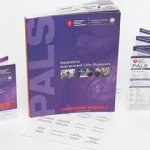The American Heart Association’s PALS Course is an Instructor-led, classroom-based course that enhances healthcare providers’ skills in the treatment of pediatric arrest and periarrest patients. The goal of the PALS Course is to improve the quality of care provided to seriously ill or injured children, resulting in improved outcomes.
The course uses a series of simulated pediatric emergencies to teach and reinforce the important concepts of a systematic approach to pediatric assessment, basic life support, PALS treatment algorithms, effective resuscitation and team dynamics.
The PALS Course is for healthcare providers who respond to emergencies in infants and children. This includes personnel in emergency response, emergency medicine, intensive care and critical care units, such as physicians, nurses, paramedics and others, who need a PALS course completion card for job or other requirements.
PALS Initial Course
PALS Renewal Course
PALS Skills Session Course
Course Content
1- and 2-rescuer child CPR and AED use
1- and 2-rescuer infant CPR
Cardiac, respiratory and shock case discussions and simulations
Key changes in pediatric advanced life support, reflecting the new science from the 2015 American Heart Association Guidelines for Cardiopulmonary Resuscitation and Emergency Cardiovascular Care
Management of respiratory emergencies
Resuscitation team concept
Rhythm disturbances and electrical therapy
Systematic Approach to Pediatric Assessment
Vascular access
The American Heart Association’s PALS training is cutting-edge in terms of its evidence-based content, and uses a well-tested methodology that can
dramatically improve both the learning and retention of lifesaving skills.

